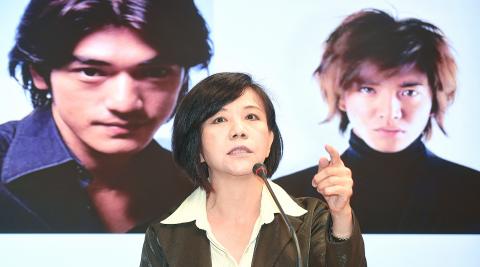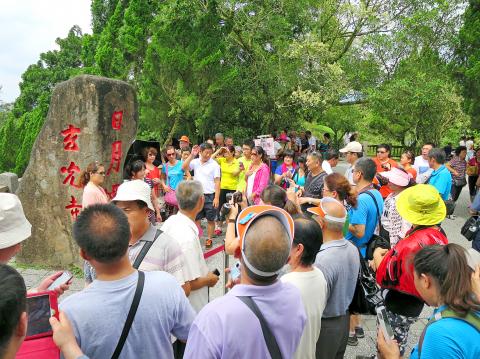Lawmakers on the Legislative Yuan’s Transportation Committee yesterday voiced concern that the nation has been over-reliant on revenue brought by Chinese tourists, saying that the Tourism Bureau needs to improve travel quality for all visitors and enhance its tourism campaigns.
The issue arose as committee members were scheduled to review the bureau’s budget for the next fiscal year at yesterday’s meeting.
Chinese Nationalist Party (KMT) Legislator Lo Shu-lei (羅淑蕾) said that mainland Chinese tourists accounted for 40 percent of total visitor numbers this year, up from 5 percent in 2008, while the percentage of visitors from Hong Kong and Macau dropped from 24 percent to 18 percent.

Photo: Liu Hsin-de, Taipei Times
Japan was once the nation’s largest source of foreign tourists, but that market has declined from 38 percent to 15 percent, she said.
Southeast Asian tourist numbers have declined from 14 percent to 9 percent, she said.
However, there has been a rise in the number of South Korean visitors, which is estimated to increase by 24 percent this year.

Photo: Liu Pin-chuan, Taipei Times
Lo said the growth of the Chinese tourism market has been in response to changes in the political situation across the Taiwan Strait.
She said Taiwanese travel agents had been told by their Chinese counterparts that Beijing would reduce the number of visitors for about a month prior to the Jan. 16 presidential and legislative elections.
As the revenue generated by Chinese visitors accounts for 70 percent of the nation’s tourism revenue, Lo asked the bureau how it planned to make up for the lost revenue.
Tourism Bureau Director General David Hsieh (謝謂君) said that China’s reaction to the elections would not affect the goal that the bureau is trying to reach this year, as Chinese tourists applying for entry permits between Dec.16 and Jan.16 would not be able to come until next year.
However, the number of Chinese tourists is expected to decrease by 10 percent next year, he said.
Democratic Progressive Party (DPP) Legislator Chen Ou-po (陳歐珀) said that the average daily expenditure per international visitor has dropped from US$257.82 in 2011 to US$221.76 last year.
Even though 40 percent of the nation’s foreign visitors are from China, Chen said their average daily expenses are far lower than those from Germany or Australia.
Chen criticized the bureau over its lack of creativity in tourism campaigns and for counting on Chinese tourists to reach its annual targets.
“You [the bureau] should stop acting like a weak daughter-in-law who always tries to please the evil mother-in-law [China],” Chen said.
DPP Legislator Yeh Yi-jin (葉宜津) said the bureau invited Taiwanese-Japanese actor Takeshi Kaneshiro (金城武) and Japanese actor Kimura Takuya to shoot tourism commercials, which highlighted the nation’s food and friendliness of the people, but these have nothing to do with the bureau, but should be credited to Taiwanese as a whole.
DPP Legislator Lee Kun-tse (李昆澤) said Japan has attracted many tourists from Southeast Asia by offering visa waivers to 67 countries.
The same measure was adopted by South Korea, which has 113 countries in its visa-waiver program. Taiwan, on the other hand, only has about 40 countries.
He said the bureau should learn from Japan by expanding the number of places in which international tourists can file for tax refunds for purchased items.
Minister of Transportation and Communications Chen Jian-yu (陳建宇) said tourists from the Southeast Asian countries can apply for visas using easier procedures, which take effect on Nov. 1.

ANOTHER EMERGES: The CWA yesterday said this year’s fourth storm of the typhoon season had formed in the South China Sea, but was not expected to affect Taiwan Tropical Storm Gaemi has intensified slightly as it heads toward Taiwan, where it is expected to affect the country in the coming days, the Central Weather Administration (CWA) said yesterday. As of 8am yesterday, the 120km-radius storm was 800km southeast of Oluanpi (鵝鑾鼻), Taiwan’s southernmost tip, moving at 9kph northwest, the agency said. A sea warning for Gaemi could be issued tonight at the earliest, it said, adding that the storm is projected to be closest to Taiwan on Wednesday or Thursday. Gaemi’s potential effect on Taiwan remains unclear, as that would depend on its direction, radius and intensity, forecasters said. Former Weather Forecast

As COVID-19 cases in Japan have been increasing for 10 consecutive weeks, people should get vaccinated before visiting the nation, the Centers for Disease Control (CDC) said. The centers reported 773 hospitalizations and 124 deaths related to COVID-19 in Taiwan last week. CDC Epidemic Intelligence Center Director Guo Hung-wei (郭宏偉) on Tuesday said the number of weekly COVID-19 cases reported in Japan has been increasing since mid-May and surpassed 55,000 cases from July 8 to July 14. The average number of COVID-19 patients at Japan’s healthcare facilities that week was also 1.39 times that of the week before and KP.3 is the dominant

The Chinese Communist Party’s (CCP) working group for Taiwan-related policies is likely to be upgraded to a committee-level body, a report commissioned by the Mainland Affairs Council (MAC) said. As Chinese President Xi Jinping (習近平) is increasingly likely to upgrade the CCP’s Central Leading Group for Taiwan Affairs, Taiwanese authorities should prepare by researching Xi and the CCP, the report said. At the third plenary session of the 20th Central Committee of the CCP, which ended on Thursday last week, the party set a target of 2029 for the completion of some tasks, meaning that Xi is likely preparing to

US-CHINA TRADE DISPUTE: Despite Beijing’s offer of preferential treatment, the lure of China has dimmed as Taiwanese and international investors move out Japan and the US have become the favored destinations for Taiwanese graduates as China’s attraction has waned over the years, the Ministry of Labor said. According to the ministry’s latest income and employment advisory published this month, 3,215 Taiwanese university graduates from the class of 2020 went to Japan, surpassing for the first time the 2,881 graduates who went to China. A total of 2,300 graduates from the class of 2021 went to the US, compared with the 2,262 who went to China, the document showed. The trend continued for the class of 2023, of whom 1,460 went to Japan, 1,334 went to